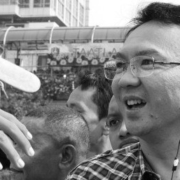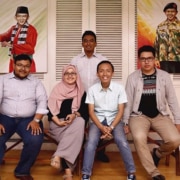
The North Jakarta District Court sentenced Basuki “Ahok” Tjahaja Purnama to two years in prison for blasphemy. Photo by Muhammad Adimaja for Antara.
Supporters of outgoing Jakarta Governor Basuki “Ahok” Tjahaja Purnama have expressed dismay at his being sentenced to two years jail for blasphemy. Many feel the decision demonstrates weaknesses in the judicial system, in particular, and that judges were more concerned with calming public tension than reaching a fair result. There are renewed calls for reform in this contentious field of law.
The motivation for the case was comments made by Ahok during a campaign appearance about a Qur’anic verse that is said by some to oblige Muslims not to elect non-Muslim political leaders (Al Maidah 51). Importantly, Ahok is a Christian as well as a member of the ethnic Chinese minority.
The trial and campaigning associated with the two-round vote for governor of the national capital were punctuated by a series of religiously charged public protests, highlighting the troubling links between a muscular form of Islamic identity and politics. Most analyses have speculated on the political implications of the result or what it means for Indonesia’s prized tradition of religious tolerance. But the outcome also demonstrates how the law and the courts can be exploited for political and religious purposes.
Two specific legal provisions were important to the outcome: articles 156 and 156a of the Criminal Code. Article 156a was introduced by legislation in the 1960s based on an earlier presidential decree and comprises what is known as the “Blasphemy Law”. The Blasphemy Law itself includes other non-criminal provisions that seek to control what might be described as “deviant” religious practices. This law has been upheld on two occasions by the Constitutional Court.
Article 156 prohibits public expressions of “hostility, hatred or contempt” towards a group in Indonesian society. “Group” includes groups who identify by religion. This article is essentially directed at controlling hate speech and vilification.
By contrast, article 156a prohibits the expression of sentiments or acts:
- “that fundamentally and by their nature are hostile, abuse or disgrace [penodaan] a religion practised in Indonesia
- with the intention that persons should not practise any religion at all that is based on Belief in Almighty God.”
Article 156a thus embraces a much wider range of conduct because the term penodaan is capable of many interpretations. The article also contains a drafting flaw: there is no conjunction between paragraphs a) and b), which seems to suggest that any act would need to satisfy paragraph b), that is promote atheism, to amount to a violation, although this is routinely ignored by the courts.
In this case the court appears to have ignored the recommendations of the prosecution to apply article 156 and instead chose to apply article 156a. This is despite the uncertain nature of these provisions, the weaknesses of which were criticised even in the decision of the Constitutional Court in 2010 that upheld them.
Commentary at the opening of the trial focused on a video of Ahok’s campaign appearance posted online, with concerns that it had been doctored. The edited version of the video raised suspicions that Ahok had criticised the Qur’an directly, whereas eyewitnesses understood Ahok to have stated that the public had been lied to by persons “using” the Qur’anic verse in question.
The prosecution in fact proceeded on the basis of the words as spoken. The court therefore dealt directly with his choice to reference the Qur’an in support of his re-election. It observed that, while the text in question may be open to interpretation, it was not for Ahok to suggest that Islamic revelation was misused or deployed against him.
The decision suggests that any statement – especially by a non-believer – that touches on fundamentals of doctrine or Qur’anic revelation is inherently an abuse of Islam. In this way the legal provisions that seek to protect religious adherence are read down to reflect a version of what might be understood as defamation of religion. Indeed this term – penghinaan – is frequently used in Indonesia as shorthand for the blasphemy provisions.
Any detailed discussion of religious practice is a difficult area for courts to enter, as it necessarily involves taking evidence about matters of doctrine. Even conscientiously seeking to protect fundamental aspects of a faith might involve a court taking sides. Defamation of religion is a notion open to broad interpretation and therefore has a lower evidentiary threshold. In essence, a court can accept it as being made out by whatever behavior or action it chooses.
It is here in the realm of doctrine that the Indonesian Council of Ulama (MUI) plays its part. Since the democratic reforms of the early 2000s, this prominent nongovernmental religious peak body has sought to increase its profile and influence. Critically, it does this through issuing fatwa (religious legal opinions) frequently in relation to current issues of the day or by making pronouncements on matters of public interest.
MUI is not the only source of expert evidence and its rulings are not legally binding nor of substantive legal effect in criminal proceedings, although they are recognised as a form of subordinate legal instrument in some contexts, for example, in the shari’a economy. Despite this, MUI’s capacity to influence the wider debate and specific legal cases cannot be understated. As in numerous other blasphemy cases, MUI’s views about Ahok’s conduct formed a key part of the background to the legal process, as well as establishing the benchmark for “correct” doctrinal interpretation.
The implications of this case for Indonesia’s widely praised social diversity are obvious. The Indonesian Constitution, in its various incarnations, has always protected freedom of religion (theoretically, at least) and the modern form embraces a wide range of civil rights. However, this framework is paired with a flawed legal regime. This regime can be deployed not so much as a protective shield to help maintain respect for all faiths but more like a sword to silence unwanted voices.
Sadly, the decision demonstrates how loose wording and a lack of attention to the fundamentals of legal process can undermine confidence in constitutional protections. And that makes errors so characteristic of Indonesia’s authoritarian past now appear not as distant as many might have thought, even if the authoritarianism may now be religious rather than military in nature.










